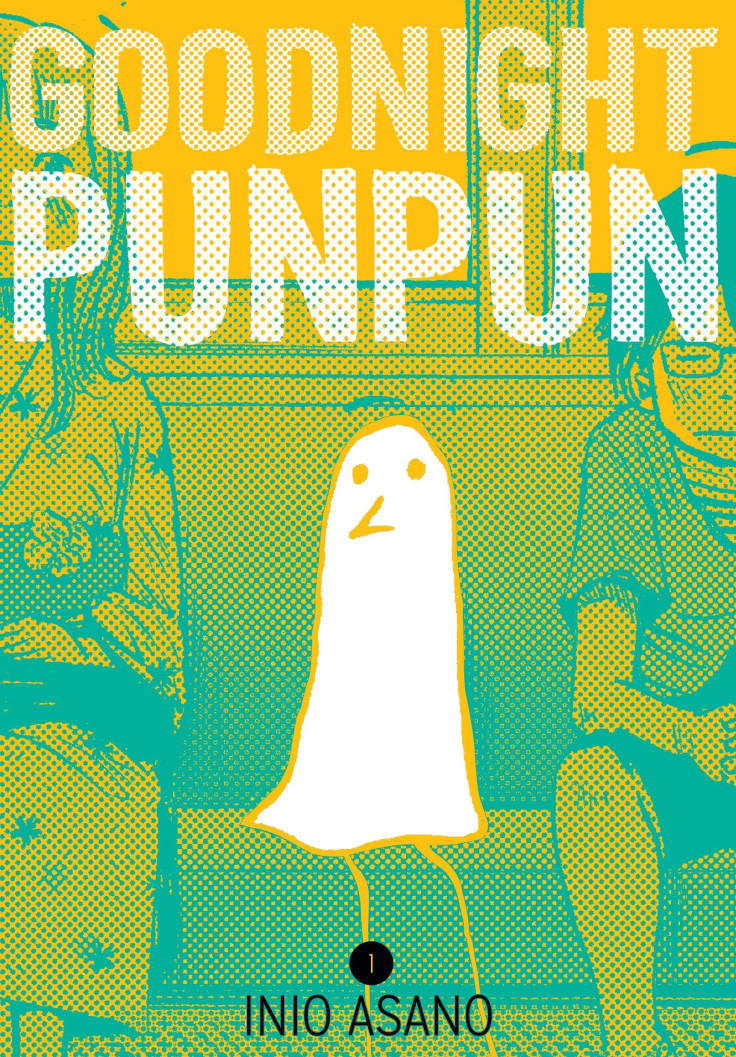Goodnight Punpun is a sad and wild story. Fitting for a coming-of-age story: has adolescence ever in its history been easy?
In Goodnight Punpun, Eisner- and Harvey Award-nominated creator Inio Asano tells the story of a young boy named Punpun Punyama. Punpun is depicted in a starkly simple, even cute fashion: he’s just a little bird with a poky little beak, drawn as a child might draw a ghost. His arms and legs are sticks; he has dots for eyes and a sideways “v” for a mouth. He’s adorable, and his whole family is styled similarly.
But the visual cuteness is just a ploy. His father is a drunk who beats his mother badly enough to put her in the hospital; his mother doesn’t seem to love him, or his father, or anything in her life. Punpun’s mother sitting up in her hospital bed, her poky bird breasts sticking straight out as she holds a cigarette in her beak, is strange and sad and jarring. Punpun’s father, a bird in a tie with a little curl of hair, slouches drunkenly in the hallway.
It can’t help but look cute and rather funny because of the doodle style of the Punyama birds, but the context is so sad it leaves you torn. These simple, ridiculous birds floating through a tense and tragic story gives you a cognitive dissonance that never quite leaves you.
Asano plays with that dissonance hard. Punpun’s a quiet, acutely sensitive sort of kid, curious and shy. His head seems filled to bursting with all his dreams, and his heart is full of feelings he can scarcely express, vividly pictured by Asano with spiraling whorls of thought exploding from Punpun’s mind. Who would have thought two black dots could convey so much intensity of feeling? When Punpun shakes and cries, his little bird form sunk into a couch or flung across a bed, your heart goes out to him. There’s no way this bird belongs in this strange world, but he’s there anyway. The visual impact alone is tremendous.
Punpun’s child peers are drawn in a gentle and appealing style, but the adults are a frightening collection of grotesques -- caricatures with bared teeth and wild faces, spit flying and eyes bulging as they pursue their incomprehensible lives. The art of the adults is detailed and repulsive in sharp contrast to Punpun’s sweet simplicity and the charming, human faces of his friends. The adults are so offputting, it doesn’t seem a great wonder that Punpun barely speaks to them. And Punpun sees God, too -- a grinning photograph of a young man with a sturdy halo of hair, yet another distinctive style in a manga filled with them.
Watching Punpun and his young friends stumble through sincerely frightening adult situations is a tense affair. They’re children; they don’t understand stakes and simply bully through page after page as things grow increasingly more serious around them. A possible murder site is a spooky adventure, but a cute girl’s anger is life-threatening, world-ending. This is only Volume 1 of VIZ’s Goodnight Punpun translation. The rest of the manga follows Punpun as he grows, so we’ll also get to see how his understanding and relationships evolve.
As far as packaging goes, the physical copy of Goodnight Punpun is sturdy and appealing. The cover is striking in yellow, turquoise and white, with Ben-Day dots providing extra visual interest as Punpun sits bright and tiny and white, front and center. The book’s size is perfectly comfortable for reading. I was very satisfied with the heft and feel of the physical product in my hand. The translation is smooth with no moments of awkwardness that prevented me from devouring the entire first volume in a sitting. For fans of Asano, indie manga fans or those looking for an energetic and imaginative manga to enjoy, Goodnight Punpun is a great read I recommend whole-heartedly.
Goodnight Punpun is rated “M” for Mature. Volume 1 is available at $24.99 via VIZManga.com as well as from the Nook , Kobo , Kindle , iBooks , comiXology and GooglePlay stores. The series is seven volumes long and will publish quarterly. It’s also available on Amazon for physical purchase.














![[EG April 19] Best 'Stardew Valley' Mods That Will Change](https://d.player.one/en/full/226012/eg-april-19-best-stardew-valley-mods-that-will-change.png?w=380&h=275&f=955520b8313253ee3c39c791f6210f38)



